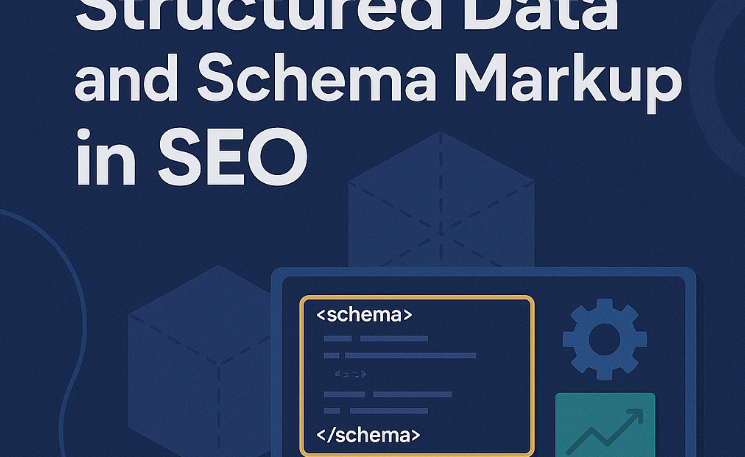
Introduction
Ever wondered how Google pulls star ratings, event dates, and product prices right into its search results? That magic happens thanks to structured data and schema markup. In the world of SEO, it’s no longer enough to just sprinkle in the right keywords. To stand out, you need to speak Google’s language—and structured data is the way to do it.
Understanding Structured Data
The Basics of Structured Data
Structured data is a standardized format for providing information about a page and classifying the page content. Think of it as metadata that tells search engines exactly what your content means, not just what it says.
How It Differs from Regular HTML
HTML tells browsers how to display information. Structured data, on the other hand, tells search engines how to understand that information. For instance, instead of just showing “Star Wars,” structured data can identify it as a “Movie” with a release date, cast, and genre.
Types of Structured Data Formats
- JSON-LD: The most recommended format by Google, easy to read and implement.
- Microdata: HTML-based, but messier to implement.
- RDFa: Similar to Microdata but more versatile for complex data relationships.
What is Schema Markup?
Schema.org Overview
Schema markup is a type of structured data vocabulary developed by Google, Microsoft, Yahoo, and Yandex. It uses tags or code to define specific content types like products, reviews, and people.
Common Schema Types
- Article
- Product
- Event
- Recipe
- LocalBusiness
- Person
JSON-LD – Google’s Favorite
JSON-LD (JavaScript Object Notation for Linked Data) is now the preferred format for implementing schema markup. It allows for embedding the data without cluttering your HTML.
How Structured Data Impacts SEO
Enhanced Search Appearance
When your site uses structured data, it becomes eligible for rich results—those fancy listings you see with images, ratings, and FAQs.
Rich Snippets and Why They Matter
Rich snippets increase visibility and user engagement. They can skyrocket your CTR because users get more context right on the search page.
Voice Search and AI Assistants
With the rise of Siri, Alexa, and Google Assistant, voice search is huge. Structured data helps these assistants pull the most relevant, structured info from your site.
Benefits of Using Schema Markup
Boost in CTR (Click-Through Rates)
More eye-catching listings mean more clicks. It’s simple psychology: people love visuals and information clarity.
Better Indexing and Crawling
Structured data helps search engines better crawl and categorize your pages, improving your visibility in SERPs.
Trust and Authority with Users
Users tend to trust websites that appear more professional and informative in search results. Rich snippets help build that trust.
Real-World Use Cases
Ecommerce (Product Markup)
Online stores use schema to highlight price, availability, and reviews—crucial factors in buyer decisions.
Local SEO (Business Info Markup)
Local businesses can use structured data to feature their address, hours, and contact info, making it easier for nearby customers to find them.
Blogs & News Articles (Article Markup)
Structured data allows articles to appear in Top Stories or with date and author name in search, boosting credibility and visibility.
How to Implement Structured Data
Manual Implementation
You can manually add schema to your HTML using JSON-LD. It’s not hard, but you need attention to detail.
Using Plugins
If you’re on platforms like WordPress, there are plugins like:
- Yoast SEO
- RankMath
- Schema Pro
These simplify the process and ensure accuracy.
Google’s Structured Data Markup Helper
Google offers a tool where you highlight content, and it generates the markup for you. Super handy for beginners.
Testing and Validating Schema
Google’s Rich Results Test
This checks if your schema is valid and if it’s eligible for rich results. Use it before going live.
Schema Markup Validator
A more detailed tool provided by Schema.org to analyze your markup in depth.
Common Errors to Watch For
- Mislabeling properties
- Missing required fields
- Using the wrong schema type
Avoid these to ensure your structured data is effective.
Best Practices for Structured Data
Keep It Relevant
Only add markup for elements that actually exist on your page. Don’t try to trick Google—it won’t end well.
Use Standardized Formats
Stick to JSON-LD for best compatibility with search engines.
Update When Content Changes
Changed your product price or event date? Update your markup too!
Common Myths and Misconceptions
Structured Data Guarantees Rankings
Nope! It doesn’t boost rankings directly, but it improves visibility, which can lead to better engagement and eventually higher rankings.
Only for Developers
False. With tools and plugins, anyone with basic tech skills can implement it.
It’s Optional
Technically, yes. But in reality, it’s becoming a must-have for competitive SEO.
The Future of Structured Data in SEO
AI-Driven Search Evolution
Search engines are getting smarter. Structured data is the fuel for their growing intelligence.
Greater Personalization in Search
Schema helps search engines serve more personalized results based on user behavior and intent.
More Rich Result Types Emerging
Expect to see even more variations like how-tos, FAQs, and video carousels dominate search.
Conclusion
Structured data and schema markup are like the translators between your content and Google’s understanding of it. They may not be flashy, but they’re incredibly powerful. If you’re not using them yet, you’re missing out on a major SEO advantage. So go ahead—give your site the visibility boost it deserves.
FAQs
1. What is the difference between structured data and schema markup?
Structured data is the general concept; schema markup is a specific vocabulary used to apply structured data on your website.
2. Does structured data improve rankings?
Not directly, but it can improve your visibility and CTR, which influence rankings over time.
3. Can I use schema without a developer?
Yes! Tools, plugins, and Google’s helper make it easy for non-developers.
4. How often should I update schema markup?
Anytime you change the relevant content—like prices, event dates, or availability.
5. Is it possible to get penalized for wrong schema markup?
Yes. Misleading or incorrect markup can lead to manual actions from Google.


